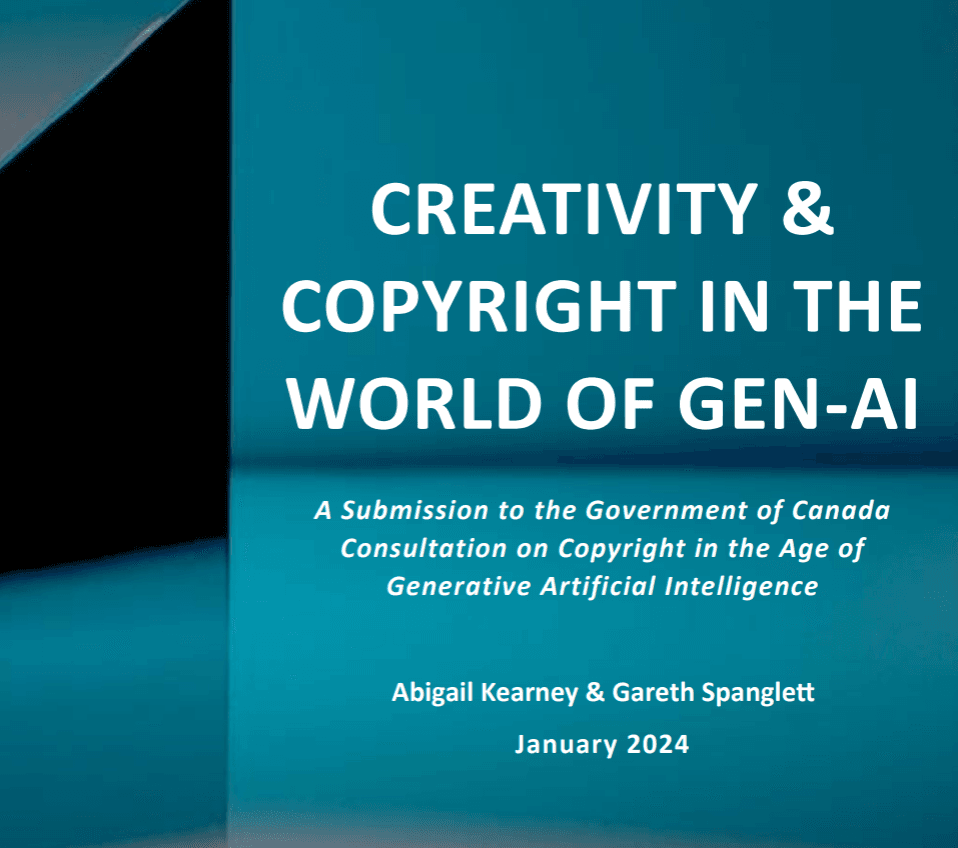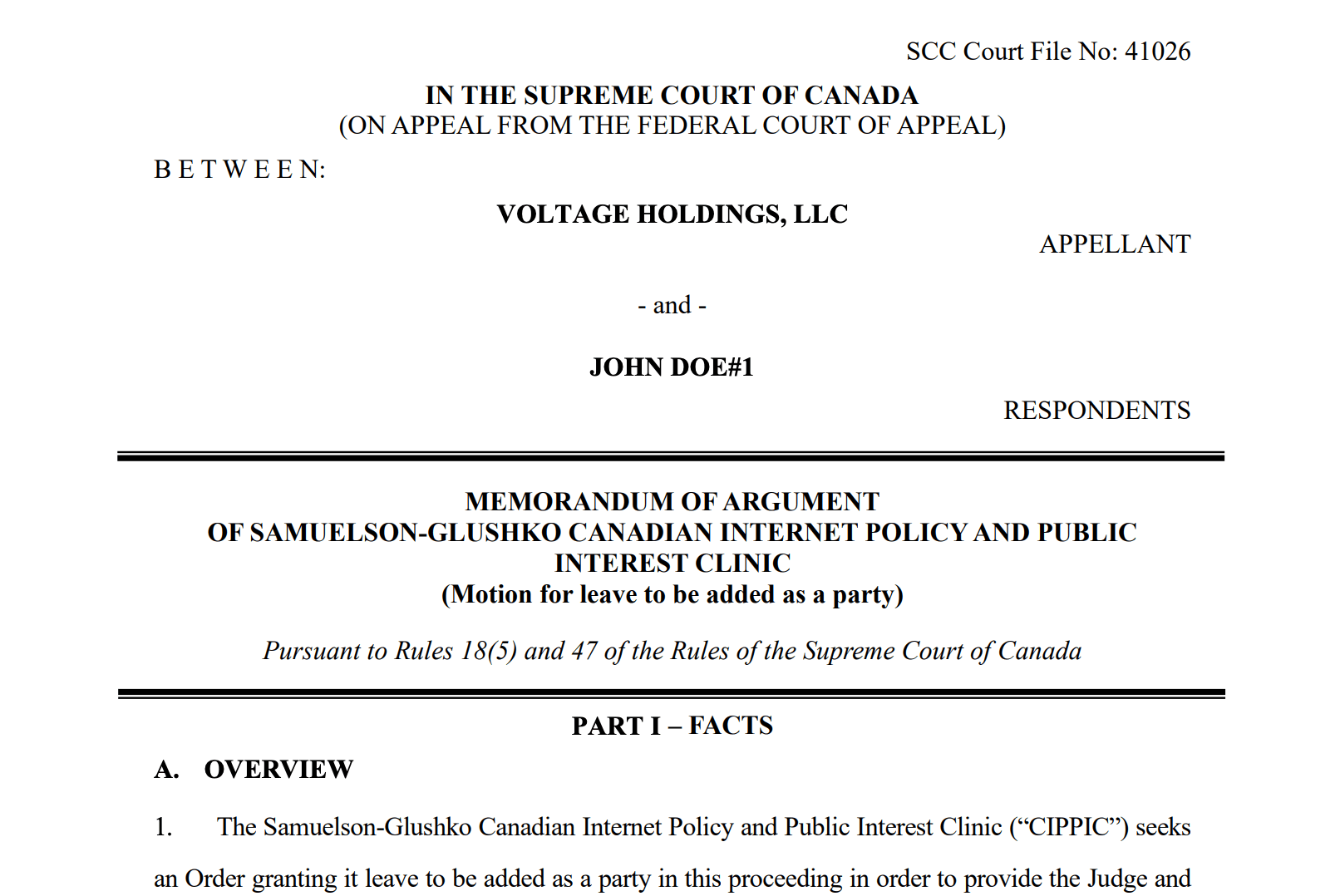students 2004 program
CIPPIC Summer 2004 Fellowship Program
Summary
The purpose of the CIPPIC Summer Fellowship Program is to provide an intensive learning experience for law school students, while contributing to public interest advocacy on issues of law and technology in Canada. Fellows will be assigned to active files, and will be expected to research issues, consult with partners and clients, and draft memos for legal counsel, submissions to government, and content for the CIPPIC website. In addition to clinical work, fellows will participate in weekly seminars on a variety of topics, led by experts in the field. During weeks in which relevant conferences are being held at the University or downtown, workshops will not be held and students will instead attend the conferences.
Logistics
The CIPPIC Summer Fellowship Program will run from Monday, May 10, 2004 to Friday, July 30, 2004. Fellows will work from the Canadian Research Laboratory of Law and Technology, where CIPPIC is currently based, in Fauteux Hall, University of Ottawa. Fauteux Hall is located at 57 Louis Pasteur St., and is the home of the Faculty of Law (both Common Law and Civil Law Sections). The lab is located in Room 506 - on the 5th Floor, at the top of staircase A (you can also take the elevator). You will need an access card to enter the lab, which you will receive on the first day of the program.
The program will begin with an introductory session on Monday May 10th at 9:30am. This session will take place in Room 224B in the Morisset (main library) building. Room 224B is located at the top of the main stairs on the 2nd floor of the library, next to the Director of Libraries Offices.
All Wednesday seminars take place in Morisset 252 (down the hall from Room 224B) unless otherwise noted.
Weekly Topics and Speakers| Date | Time | Subject | | --- | --- | --- | | May 12 | 11:00am | Access to Information (Aaron Freeman/David McKie) | | May 20-21 | all day | Copyright Conference | | May 26 | 11:00am | End-to-End Networking; UNUM (Tim Denton) | | June 2 | 11:00am | Domain Name Governance - WHOIS (Kim Von Arx) | | June 10 | 3:00pm | Anonymity and Authentication (Roger Clarke) | | June 11 | 3:00pm | Anonymity and Social Values (David Phillips) | | June 16 | 11:00am | Internet Access (Leslie Shade) | | June 21-22 | all day | ECommerce Conference | | June 30 | 11:00am | Voluntary Codes & Standards in E-Commerce (Kernaghan Webb) | | July 7 | 11:00am | Open Source and iCommerce (Marcus Bornfreund) | | July 14 | 11:00am | The Internet and Human Rights (Valerie Steeves) | | July 21 | 11:00am | Privacy: A Brief Legal History + Future Risks (Stephanie Perrin) | | July 28 | 11:00am | Online Census (David Bolger) |
Syllabus
May 10th
Introduction to CIPPIC
9:30 am, Room MRT-224B
Speakers
Philippa Lawson, Executive Director, CIPPIC
Topics
- Introductions
- Overview of CIPPIC
- Project work, client work
- Case Assignments
- Technology Lab - access cards, computer station assignments, other lab users
- CIPPIC Office Procedures
Readings
- CIPPIC website
- CIPPIC Practices and Procedures Manual
Social Event - Meet and Greet
5:00pm, Nostalgica (restaurant/pub, corner of University & Cumberland)
May 11th
Professor Michael Geist
CIPPIC and the University of Ottawa Law & Technology Program
10:00 am, Tech Lab meeting room
May 12th
Using Access to Information laws in the public interest
Speakers
- Aaron Freeman, Medialine.ca
- David McKie, CBC
Issues
- Why do we have "access to information" laws?
- How can they be used to further the public interest?
- How can CIPPIC students use ATI laws in their research?
- What are the common problems ATI applicants will face?
- Which tactics can applicants use to get around those problems?
Readings
- Federal Access to Information Review Task Force Report, Key Points from the Report (3 pages)
- Office of the Information Commissioner, Annual Report 2002-2003: Reform of the Access to Information Act (2 pages)
- Some Comments for the MPs' Committee on Access, prepared by Michael A. Dagg (6 pages)
- Federal Access to Information Statistical Tables; 2001-2002 pages 7-10; 1983-2001 pages 19-20; (6 pages)
- Access to Information under Ontario's Information and Privacy Acts (2 pages)
- Federal Access to Information Act
- Ontario Freedom of Information and Protection of Privacy Act
- Texts in CIPPIC library
- McNairn and Woodbury, Government information: Access and Privacy
- Drapeau and Racicot, Federal Access to Information and Privacy Legislation Annotated 2004
May 20-21st
ALAI Copyright Conference
"Rethinking Copyright: A Roadmap to the Future of Copyright"
This international conference, hosted by the University of Ottawa's Faculty of Law, will bring together a wide range of well-known foreign and Canadian speakers and shed new light on the foundations of copyright. After several decades full of new challenges, many of them created by technological developments and the scattershot legislative reactions, should we rethink the basic principles of copyright to better respond to the needs of our constantly changing society? ALAI Canada offers a unique opportunity to engage in major debates and learn more about the inner workings of copyright. Among the questions addressed will be the foundations of copyright, the notion of originality, the structure of patrimonial rights, exceptions to copyright, technical and contractual measures accompanying copyright, the loss of exclusivity of patrimonial rights through the example of private copying, and moral rights.
May 26th
End-to-End Networking (before lunch)
Speaker
Tim Denton, consultant/lawyer
Issues
- What is the significance of end-to-end networking?
- Is the end-to-end design of the Internet changing?
- What economic and political forces are influencing Internet design?
- How can public interest groups influence these trends?
Readings
Denton and Menard, "A Paradigm Shift for the Stupid Network: Interconnecting with Legacy Networks in the Internet Era" (2000)
ENUM (after lunch)
Speaker
Tim Denton, consultant/lawyer
Issues
- What is "ENUM"? Why is it important?
- What are its implications for privacy?
- What interests are driving the development of ENUM?
- Who is involved in the development of ENUM standards?
- Who is raising concerns about ENUM, and what are their concerns?
- What is the Canadian government doing in respect of ENUM?
Readings
June 2nd
Domain Name Governance and the WHOIS database
Speaker
Kim Von Arx, General Counsel, Canadian Internet Registration Authority
Issues
- What is the WHOIS database, and what is its purpose?
- What are the current policies applicable to publication of WHOIS information?
- What information should be made publicly available via the WHOIS database?
- How can individual privacy and domain name accountability be reconciled?
Readings
- www.cira.ca - review CIRA WHOIS database
- EPIC WHOIS webpage
- Public Voice letter
June 10th
Authentication: Challenges to autonomy and anonymity
(SSHRC project open session) Time and place TBD
Speaker
Roger Clarke, consultant; Visiting Fellow, Australian National University
Issues
- In what circumstances is electronic authentication necessary?
- Does electronic authentication necessarily compromise individual privacy?
- How can privacy be protected in authentication systems?
Readings
See relevant articles on Roger Clarke's website.
June 11th
The social value of online anonymity (SSHRC project open session)
Time and place TBD
Speaker
Prof. David Phillips, University of Texas and University of Tampere, Finland
Issues
- How is online anonymity important to a healthy society?
- How is anonymity used by individuals in socially beneficial ways?
- How can we protect beneficial uses of anonymity without also protecting abuses?
Readings
- "Negotiating the Digital Closet: Online Pseudonymity and the Politics of Sexual Identity" (forthcoming in Information, Communication, and Society)
- "Cryptography, Secrets, and the Structuring of Trust", in Agre, Phil and Marc Rotenberg (Eds.) Technology and Privacy: The New Landscape. Cambridge, MA: MIT Press. 1997.
June 16th
Internet Access
Speaker
Prof. Leslie Regan Shade, Concordia University, Department of Communication Studies
Issues
- Conceptualizing Access - How is access defined? What is a holistic model of access that encompasses the technical and the social infrastructure? What are gendered dimensions of access?
- Digital Divide Debates - What is meant by the digital divide, and how has this concept been discussed in information and communication policy?
- Canadian Policy - What have been Canadian policies and programs related to access? What has been the role and success of public interest groups in promoting access?
- International Policy - What are some of the trends in the 'ICT4D' (ICT for development movement), and who has been pushing this agenda?
Readings
- Conceptualizing Access: Michael Gurstein. (Decciteber 2003). Effective use: A community informatics strategy beyond the digital divide. First Monday 8(12).
- Digital Divide Debates: Bill Birdsall. (Decciteber 2000). The Digital Divide in the Liberal State: The Canadian Perspective. First Monday 5(12).
- Canadian Policy: Andrew Clciteent, Marita Moll, and Leslie Regan Shade (2001) "Debating Universal Access in the Canadian Context: The Role of Public Interest Organizations", pp. 23-48 in E-Commerce vs. E-Commons: Communications in the Public Interest, ed. Marita Moll and Leslie Regan Shade. Ottawa: Canadian Centre for Policy Alternatives.
- International Policy: Leslie Regan Shade. (March 2003). Here Comes the Dot Force! The New Cavalry for equity. Gazette Vol. 65(2): 105-118.
June 30th
Consumer e-commerce, voluntary approaches, and the law: finding the right mix
Speaker
Kernaghan Webb, Senior Legal Policy Advisor, Industry Canada
Issues
- What are the limitations of conventional legal approaches which "create the space" for voluntary approaches to be used to address consumer e-commerce issues?
- What are the strengths of voluntary approaches used to address consumer e-commerce issues?
- What are the limitations of voluntary approaches used to address consumer e-commerce issues?
- How can law be used to support or supplement voluntary consumer e-commerce initiatives?
- How can or does the legal system impede or constrain the use of voluntary approaches to address consumer e-commerce issues?
Readings
- Canadian Code of Practice for Consumer Protection in Electronic Commerce
- S. Homer, "Getting the international consumers point of view into standards development," ISO Bulletin August 2003, downloadable at:
- Canadian Guide on Consumer Complaints Management for Canadian Business
- Canadian Guide on Development and Use of Voluntary Codes
- Consumers International, Should I buy? Shopping online 2001: An international comparative study of electronic commerce
July 7th
iCommons and the Open Source software movement
Speaker
Marcus Bornfreund, Manager, Law & Technology program, University of Ottawa Faculty of Law
Issues
- What is behind the "Creative Commons" initiative?
- How does copyleft differ from copyright?
- Why is open-source important to culture and/or innovation?
- What is the 'open-source way'?
Readings
- Get Creative (Flash Movie)
- CC Spectrum of Rights (Comic)
- iCommons Project, CIPPIC: iCommons Canada
- Categories of Free and Non-Free Software
- The Open Source Definition
- GNU General Public License
July 14th
The Internet and Human Rights
Speaker
Prof. Valerie Steeves, Carleton University and Media Awareness Network
Issues
- What is the corporate agenda behind online surveillance?
- How does surveillance structure the online social environment, particularly for children?
- Are laws regulating the distribution of online pornography effective? Why or why not?
- What is the relationship between privacy and freedom of expression?
Readings
V. Steeves, (2002) Privacy and New Media, Mediascapes, edited by P. Attallah and L. Shade, Toronto: Thomson.
July 21st
A Brief History of Privacy laws; Privacy Risks on the Horizon
Speaker
Stephanie Perrin, Digital Discretion (privacy consultant); EPIC Fellow
Issues
- Where does privacy law originate?
- Why do we have privacy laws?
- What forces are influencing the development of privacy laws?
- What are some key privacy risks on the horizon?
- What should privacy advocates be doing to address these risks?
Readings
- Philip E. Agre and Marc Rotenberg eds., Technology and Privacy: The New Landscape, MIT Press, 1998.
- Simson Garfinkel, Database Nation, O'Reilly 2000.
July 28th
Challenges of Online Collection of Personal Information in the 2006 Census of Population
Speaker
David Bolger, Legal Counsel, Statistics Canada
Issues
- What is the Census and why conduct it online?
- Logistical problems, privacy problems
- Overcoming the public's concerns about disclosing personal information
- Measuring success
Readings
- Statistics Act, R.S.C. 1985, c. S-19, ss. 3, 5-7, 13, 17-19, 21, 22, 30-32.
- Privacy Act, R.S.C. 1985, c. P-21, ss. 2-5, 7, 8, 12, 19, 20-22, 25-28.
- Access to Information Act, R.S.C. 1985, c. A-1, ss. 2-4, 6, 10, 12-20.
- Statistics Canada Policies
- Treasury Board Secretariat Policies



